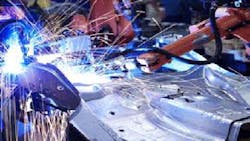US Manufacturing to Capture Larger Share of Global Market
WASHINGTON -- After decades of hollowing out, U.S. manufacturing is overtaking competitors and stands to grab up to $115 billion more in export business from rivals by 2020, a new report said Tuesday.
The Boston Consulting Group study said a more productive U.S. factory sector, enjoying cheaper energy and relatively lower wages, will pull production from leading European countries, Japan and China.
Within six years that production will capture $70 billion to $115 billion in annual exports that would have come from the countries.
And together with "reshored" manufacturing from China, where rising wages are undermining its competitiveness, the shift could add from 2.5 million to 5 million jobs in the country, the study said.
"The U.S. is steadily becoming one of the lowest-cost countries for manufacturing in the developed world," BCG said.
It said that by 2015, average manufacturing costs in the five major advanced export economies -- Germany, Japan, France, Italy and Britain -- will be 8%-18% higher than those in the United States.
By that time US labor costs will be 16% lower than in Britain, 18% below Japan's, 34% below Germany's and 35% below labor costs in France and Italy.
Moreover, the report underlined, the U.S. workforce has much greater flexibility than its industrial rivals.
The second key advantage in the United States is the sharp fall in energy prices due to the boom in shale gas production.
"Cheap domestic sources of natural gas translate into a significant competitive advantage for a number of U.S.-based industries."
That will especially help chemicals and plastics industries, but also producers of primary metals, paper and synthetic textiles.
BCG said a common assumption is that manufacturing leaving Europe and Japan would go to China.
However, it argued, Chinese wages have been rising so fast that its cost advantage on many goods it sells to the U.S. will only be around 5% in 2015.
"When logistics, shipping costs, and the many risks of operating extended global supply chains are factored in, it will be more economical to make many goods now imported from China in the U.S., if they are consumed in the U.S."
The study pointed to signs that the shift is already happening: Toyota exporting U.S.-assembled cars to South Korea and Honda boosting its U.S. export-directed production; Siemens building gas turbines in the United States to sell to Saudi Arabia; and France's Michelin making large earthmover tires for export in the United States.
"While the impact of this trend on U.S. jobs is currently modest, we expect a significant increase in such announcements starting around 2015, as the economic case for reshoring to the U.S. grows stronger."
Copyright Agence France-Presse, 2013
About the Author
Agence France-Presse
Copyright Agence France-Presse, 2002-2025. AFP text, photos, graphics and logos shall not be reproduced, published, broadcast, rewritten for broadcast or publication or redistributed directly or indirectly in any medium. AFP shall not be held liable for any delays, inaccuracies, errors or omissions in any AFP content, or for any actions taken in consequence.
